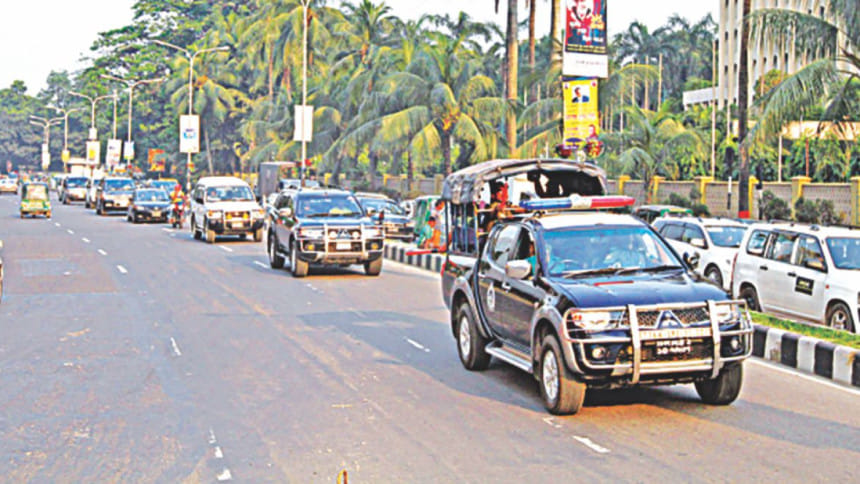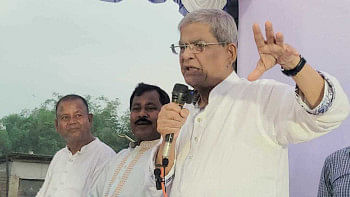Dhaka’s traffic agony

Traffic congestion in Dhaka city is considered to be one of the most chaotic in the world. Dhaka residents go through immense physical stress and incur monetary losses in terms of man-hours due to the large amount of time spent on the road on working days. The local media has constantly been highlighting these issues and has identified many other reasons behind Dhaka's notorious traffic jam.
Unfortunately, road infrastructures in Dhaka city have not flourished in tandem with its population growth and modern needs. Some of the primary causes of Dhaka's traffic jam are: (i) infrastructural issues; (ii) overpopulation; (iii) weak implementation of traffic rules; (iv) poor knowledge of traffic laws; (v) flouting traffic laws; and (vi) other issues.
The category "other issues" includes escorting VIPs, street processions, strikes, etc. It also includes the irresponsible, dangerous and unlawful behaviour of some security personnel who stop the traffic flow for their own interests on a daily basis. This piece takes on the manmade causes, especially escorting VIPs during peak traffic hours and the way in which law enforcement personnel disrupt traffic flow in Dhaka city.
Our political leaders violate traffic laws and cause the loss of other road-users' valuable man-hours on a regular basis. It is contradictory to the oaths these VIPs have taken, which raises the question: How do they do that?
To answer this question, we have to look at the daily life of the average Dhaka resident who faces tailbacks to go from point A to point B. For example, traffic is stopped in the middle of the road, regardless of whether it is an emergency, traffic signs are mounted, and police personnel are appointed every two metres on the road whenever the lucky ones, the VIPs, happen to be in movement. An example of such a traffic route is Sher-e-Bangla area to the PMO or to Bangladesh Secretariat.
We also witness on a daily basis security force personnel stopping the traffic flow during peak hours in order to make way for one of its own vehicles. These scenarios can usually be seen on the route from Bijoy Shoroni to Shahjalal International Airport.
A reasonable protocol for VIPs is always understandable. The monetary cost incurred from escorting VIPs is fully covered by tax revenues. But when it comes to dozens of jeeps filled with security officials for every VIP, traffic becomes unbearable for the rest of us—armoured vehicles, government convoys, police here and there, and on top of it all, extremely rude law enforcement officials shoving vehicles aside for a single person.
Nothing has been done to question such outrageous waste of public money and loss of man-hours. All this despite the general people diligently paying their fair share of taxes.
Traffic jam caused by the aforementioned category of "other issues" can be analysed through the lens of roads as a common property resource, which is restricted to a number of agents and the use by one agent can affect the use by others. Here, all travellers face the same average journey time where VIPs are entitled to be protected with tax revenue, but not by imposing extra cost to ordinary road-users. Therefore, the current scenario in Dhaka city is not economically efficient and it causes a negative externality. Economists Pigou (1920) and Coase (1960) laid the foundation of this argument in the early 20th century. The kind of traffic jam we are experiencing causes market price mechanism to fail in achieving efficiency. It creates deadweight loss and undermines social welfare, which is contradictory to the pledges these VIPs have taken.
Recently, in a report in The Daily Star regarding ways in which traffic congestion can be eased, Obaidul Quader, Minister of Road Transport and Bridges, said that from now on no rallies would be allowed to be held anywhere in Dhaka on a working day. This declaration was long overdue but it is a good start. VIPs might want to rearrange their commuting patterns so that road-users do not end up suffering. Having offices-cum-residences would be helpful in internalising the negative externalities. Similarly, unlawful behaviours mentioned previously should be corrected. Stopping travellers in the middle of the road just to allow a vehicle of the VIP or contingent to turn left or right is not the way.
Akim M Rahman is assistant professor in the department of economics at the School of Business, Canadian University of Bangladesh.





Comments